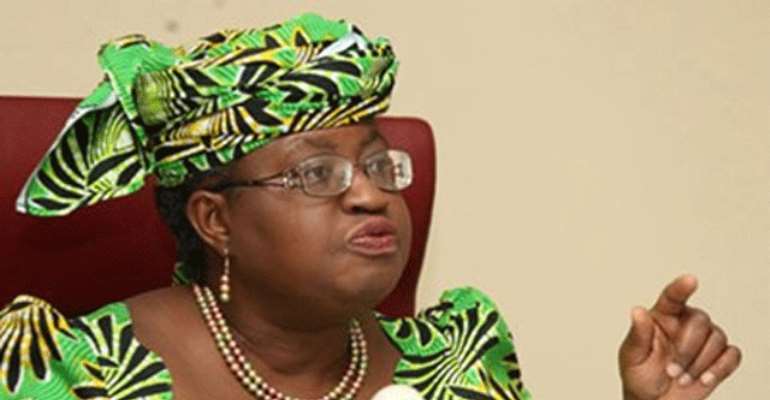Fitch Ratings affirms Nigeria's BB- at stable outlook again

Fitch Ratings has, once again, affirmed Nigeria's BB-rating and a stable outlook for the economy.
The ratings which was announced by the global rating agency in London on Monday came a few days after another respected international rating agency, Standard & Poor’s also affirmed a strong and positive rating for the management of the Nigerian economy with a BB-.
The agency retained Nigeria’s Long-term foreign and local currency, International Depository Receipts, IDRs, and senior unsecured bond ratings at ‘BB-’ and ‘BB’ respectively.
According to Fitch, Nigeria economic outlook is stable, with very strong macro-economic index, as the Gross Domestic Product, GDP, growth rate has remained in the region of 6 and 7 per cent, and single digit inflation rate.
Reacting to Fitch's report, the Coordinating Minister for the Economy and Minister of Finance, Dr. Ngozi Okonjo-Iweala, said it was an affirmation of the resilience of the country's economy which in turn reflects the resilience of Nigerians.
She said, “This confirms that Nigeria’s economy is resilient just like the Nigerian people are resilient. What’s important about the ratings is that while acknowledging all the challenges the economy faces, it points to and applauds the strengths such as progress in the the power sector, increased focus on agriculture, strong investment in local manufacturing and other areas.”
The stable outlook, in Fitch Ratings' view, reflects the fact that upside and downside risks are well balanced.
The ratings agency explained that its affirmation reflected its opinion on the true position of the Nigerian economy.
It said, 'the affirmation reflects the following key rating drivers: GDP growth slowed to 6.4% in H113 but has shown resilience in the face of exogenous shocks: severe floods in 2012 which hit agricultural output; security problems especially in the north earlier this year; and increased oil theft and vandalism and the consequent repair shutdowns which have caused oil output to contract for the second year in a row.
' The non-oil economy has slowed but still grew by 7.9% in 2012 and 7.6% in H113. Non-oil growth should pick-up in H213 as normal weather has resumed and the authorities have responded to security problems. Reforms to the electricity and agriculture sectors could start to boost potential growth.
'Inflation has been in single digits all year – the lowest in five years and the longest stretch of single digit inflation since 2008. Policy rates are unchanged. The central bank (CBN) has the twin aims of achieving single-digit inflation and maintaining exchange rate stability.
'Public finances remain comfortable. Fitch estimates a general government deficit of around 1.8% of GDP this year and next. Both oil and non-oil revenues are under-budget and the Excess Crude Account (ECA) has been tapped to compensate.
'Capital spending also remains under budget. The draft 2014 budget plans ambitious fiscal consolidation, with lower oil production and benchmark oil prices and lower spending than the 2013 budget.'
The agency said it expected that 'oil production will likely fall short again, and the final budget that emerges from the National Assembly (NA) is likely to be more expansionary but it expected general government debt to remain stable at just over 20% of GDP, this year.
It added, 'Nigeria’s sovereign and overall external balance sheets, current account surplus, debt service ratio and external liquidity are all stronger than ‘BB’ category medians. Foreign reserves rose steadily in early 2013 but have been falling since May due to reduced oil output, prompting ECA drawdown, and global market turbulence, which has reduced foreign appetite for NGN paper (though net inflows have continued).
'CBN intervened to support the naira when it came under pressure mid-year after Fed-tapering turbulence, although reserves have held up much better than many large emerging markets. Nigeria effectively re-opened the Eurobond market in July, raising USD1bn in its second issuance'. Fitch viewed the nation's reformed programmes as having mixed results, 'electricity privatisation has passed a key milestone with generators and distributors now in private hands.
'Output seems to be on a rising trend, although it has been affected by gas pipeline damage and an impact on GDP growth is hard to discern.
'Agricultural reforms are also gaining traction. The most obvious benefit to the economy has been a fall in imports last year, due to reduced oil subsidy payments, a crackdown on fraud in the oil subsidy system and substitution in the agricultural sector'.
The agency noted the failure of the National Assembly to pass the Petroleum Industry Bill, PIB, a situation it attributed to 'strong vested interests' would make reform in that sector 'a continual struggle, especially with elections in 2015'.
It also said that the Nigeria’s ratings remained 'constrained by weak governance, low per capita income and vulnerability to oil price volatility' and that 'data weaknesses hamper the monitoring of economic and fiscal performance and reform progress'.
It acknowledged the security challenges posed by insurgents and said that 'the government is responding to the Boko Haram insurgency mainly with security measures'.
